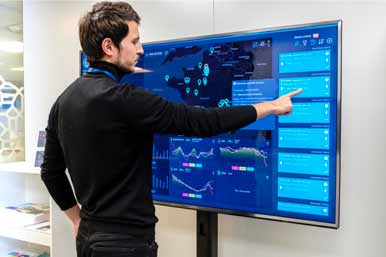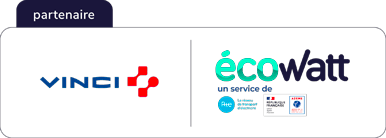VINCI commits to an energy-efficiency approach
VINCI is committed to a sustainable approach to energy efficiency in line with its environmental transition plan, which aims to significantly limit the impact of its activities. The aim is to reduce its carbon footprint by 40% in scopes 1 and 2, and by 20% in scope 3 by 2030.
To help limit the risks to France's electricity and natural gas supply, the Group will speed up the rollout of energy efficiency technologies, and go further in reducing its consumption. For example, VINCI is committed to reducing its annual consumption of natural gas and electricity by about 58,000 MWh, or 15% of its consumption in 2023, across all its concession businesses and offices at its French sites. This is equivalent to the annual consumption of a town with a population of 33,000.
Gas and electricity consumption
in 2023
_______
saved
_______
To achieve this target reduction, VINCI will make structural adjustments. Employees will be encouraged to adopt eco-habits given that they are already fully invested in the environmental transition plan. For example, insofar as possible, the temperature in offices should be reduced to 19 °C, or even 17 °C in airport terminals, air conditioners should not be switched on below 26 °C, the rollout of LED bulbs should be continued, particularly for public lighting on motorway concessions, and lighting and appliances on standby should be switched off when not in use.

As some buildings, such as VINCI's head office, Archipelago, are equipped with fine control systems, more extensive trials will be monitored to quantify consumption savings. Feedback from employee and user surveys will be used to identify additional actions to strengthen the long-term action plan.
Savings measures are already being implemented across VINCI's industrial activities, mainly related to roadworks. These include covering material stocks to reduce energy consumption for drying, producing warm asphalt mixes, implementing management tools to assist with facility eco-operation, and optimising processes to keep start-up consumption to a minimum. These actions are further enhanced through investments in photovoltaic energy capacity for self-consumption, continued work on insulating production sites, and product and facility innovations.
For these industrial activities, a very significant reduction in consumption during periods of high demand is envisaged in France and is being discussed with the public authorities. The overall impact of this approach is expected to be approximately 25,000 MWh.
As a signatory to the EcoWatt charter, VINCI is committed, alongside RTE and Ademe, to informing its employees, concession users and partners about the best practices to be implemented under the EcoWatt scheme.

